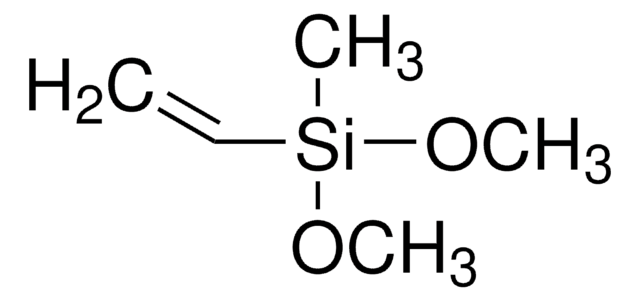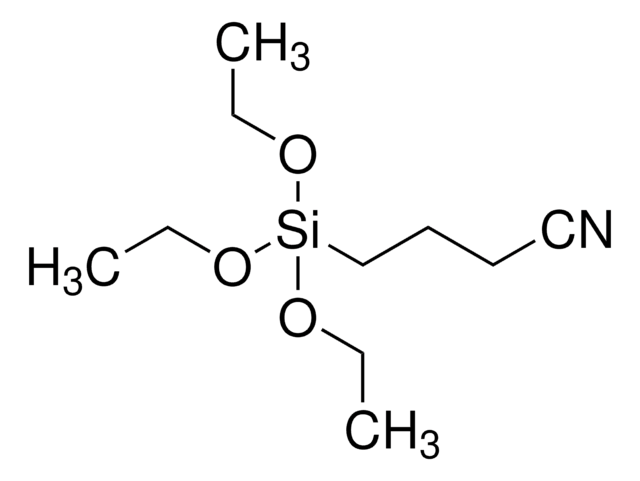539252
3-Glycidoxypropyldimethoxymethylsilane
97%
Synonym(s):
(3-Glycidoxypropyl)methyldimethoxysilane
Sign Into View Organizational & Contract Pricing
All Photos(1)
About This Item
Empirical Formula (Hill Notation):
C9H20O4Si
CAS Number:
Molecular Weight:
220.34
EC Number:
MDL number:
UNSPSC Code:
12352103
PubChem Substance ID:
NACRES:
NA.23
Recommended Products
Quality Level
Assay
97%
form
liquid
refractive index
n20/D 1.432 (lit.)
bp
100 °C/4 mmHg (lit.)
density
1.02 g/mL at 25 °C (lit.)
SMILES string
CO[Si](C)(CCCOCC1CO1)OC
InChI
1S/C9H20O4Si/c1-10-14(3,11-2)6-4-5-12-7-9-8-13-9/h9H,4-8H2,1-3H3
InChI key
WHGNXNCOTZPEEK-UHFFFAOYSA-N
General description
3-Glycidoxypropyldimethoxymethylsilane (GDMMS) is an epoxy-silane that is used to form a silane based coupling agent for functionalization of a variety of substrates. The epoxy groups allow good adhesion of surface atoms and form a stable polymeric structure.
Application
3-Glycidoxypropyldimethoxymethylsilane (GDMMS) precursor was used to develop zwitterionic push – pull chromophore and carbazole-derivatives-doped hybrid organic–inorganic homogeneous films.{71}
GDMMS can surface modify indium tin oxide (ITO) glass substrate for the immobilization of surface atoms which can be further used for the electrochemical detection and labeling. It can also be used as a hardener in the formation of multi-component silicone based rubber.
The usual cure time is 16-20 hours at room temperature or 1 hour at 100C.
Storage Class Code
10 - Combustible liquids
WGK
WGK 3
Flash Point(F)
221.0 °F - closed cup
Flash Point(C)
105 °C - closed cup
Personal Protective Equipment
dust mask type N95 (US), Eyeshields, Gloves
Choose from one of the most recent versions:
Already Own This Product?
Find documentation for the products that you have recently purchased in the Document Library.
Customers Also Viewed
Electro-optics poled sol-gel materials doped with heterocycle push-pull chromophores.
Della Giustina G, et al.
Materials Science and Engineering, C, 26(5-7), 979-982 (2006)
Label-free ITO-based immunosensor for the detection of very low concentrations of pathogenic bacteria.
dos Santos MB, et al.
Bioelectrochemistry, 101(11), 146-152 (2015)
Photoelectrochemical response of carbon dots (CDs) derived from chitosan and their use in electrochemical imaging.
Zhang D, et al.
Materials Horizons, 5(3), 423-428 (2018)
Surface functionalization using catalyst-free azide- alkyne cycloaddition.
Kuzmin A, et al.
Bioconjugate Chemistry, 21(11), 2076-2085 (2010)
Headgroup effect on silane structures at buried polymer/silane and polymer/polymer interfaces and their relations to adhesion.
Zhang C, et al.
Langmuir, 28(14), 6052-6059 (2012)
Our team of scientists has experience in all areas of research including Life Science, Material Science, Chemical Synthesis, Chromatography, Analytical and many others.
Contact Technical Service












